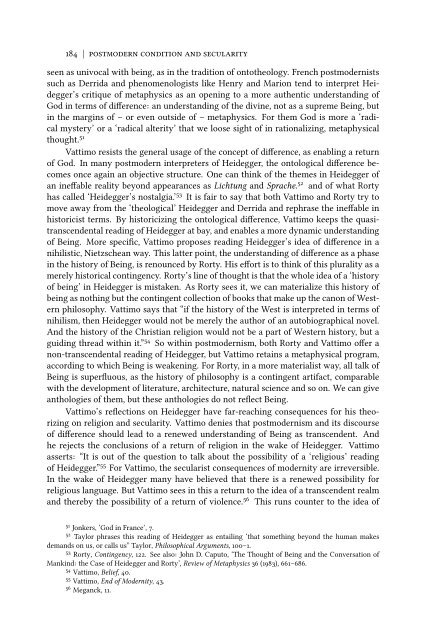Secularization as Kenosis
Secularization as Kenosis
Secularization as Kenosis
Create successful ePaper yourself
Turn your PDF publications into a flip-book with our unique Google optimized e-Paper software.
184 | postmodern condition and secularity<br />
seen <strong>as</strong> univocal with being, <strong>as</strong> in the tradition of ontotheology. French postmodernists<br />
such <strong>as</strong> Derrida and phenomenologists like Henry and Marion tend to interpret Heidegger’s<br />
critique of metaphysics <strong>as</strong> an opening to a more authentic understanding of<br />
God in terms of difference: an understanding of the divine, not <strong>as</strong> a supreme Being, but<br />
in the margins of – or even outside of – metaphysics. For them God is more a ‘radical<br />
mystery’ or a ‘radical alterity’ that we loose sight of in rationalizing, metaphysical<br />
thought. 51<br />
Vattimo resists the general usage of the concept of difference, <strong>as</strong> enabling a return<br />
of God. In many postmodern interpreters of Heidegger, the ontological difference becomes<br />
once again an objective structure. One can think of the themes in Heidegger of<br />
an ineffable reality beyond appearances <strong>as</strong> Lichtung and Sprache. 52 and of what Rorty<br />
h<strong>as</strong> called ‘Heidegger’s nostalgia.’ 53 It is fair to say that both Vattimo and Rorty try to<br />
move away from the ‘theological’ Heidegger and Derrida and rephr<strong>as</strong>e the ineffable in<br />
historicist terms. By historicizing the ontological difference, Vattimo keeps the qu<strong>as</strong>itranscendental<br />
reading of Heidegger at bay, and enables a more dynamic understanding<br />
of Being. More specific, Vattimo proposes reading Heidegger’s idea of difference in a<br />
nihilistic, Nietzschean way. This latter point, the understanding of difference <strong>as</strong> a ph<strong>as</strong>e<br />
in the history of Being, is renounced by Rorty. His effort is to think of this plurality <strong>as</strong> a<br />
merely historical contingency. Rorty’s line of thought is that the whole idea of a ‘history<br />
of being’ in Heidegger is mistaken. As Rorty sees it, we can materialize this history of<br />
being <strong>as</strong> nothing but the contingent collection of books that make up the canon of Western<br />
philosophy. Vattimo says that “if the history of the West is interpreted in terms of<br />
nihilism, then Heidegger would not be merely the author of an autobiographical novel.<br />
And the history of the Christian religion would not be a part of Western history, but a<br />
guiding thread within it.” 54 So within postmodernism, both Rorty and Vattimo offer a<br />
non-transcendental reading of Heidegger, but Vattimo retains a metaphysical program,<br />
according to which Being is weakening. For Rorty, in a more materialist way, all talk of<br />
Being is superfluous, <strong>as</strong> the history of philosophy is a contingent artifact, comparable<br />
with the development of literature, architecture, natural science and so on. We can give<br />
anthologies of them, but these anthologies do not reflect Being.<br />
Vattimo’s reflections on Heidegger have far-reaching consequences for his theorizing<br />
on religion and secularity. Vattimo denies that postmodernism and its discourse<br />
of difference should lead to a renewed understanding of Being <strong>as</strong> transcendent. And<br />
he rejects the conclusions of a return of religion in the wake of Heidegger. Vattimo<br />
<strong>as</strong>serts: “It is out of the question to talk about the possibility of a ‘religious’ reading<br />
of Heidegger.” 55 For Vattimo, the secularist consequences of modernity are irreversible.<br />
In the wake of Heidegger many have believed that there is a renewed possibility for<br />
religious language. But Vattimo sees in this a return to the idea of a transcendent realm<br />
and thereby the possibility of a return of violence. 56 This runs counter to the idea of<br />
51 Jonkers, ‘God in France’, 7.<br />
52 Taylor phr<strong>as</strong>es this reading of Heidegger <strong>as</strong> entailing ‘that something beyond the human makes<br />
demands on us, or calls us” Taylor, Philosophical Arguments, 100–1.<br />
53 Rorty, Contingency, 122. See also: John D. Caputo, ‘The Thought of Being and the Conversation of<br />
Mankind: the C<strong>as</strong>e of Heidegger and Rorty’, Review of Metaphysics 36 (1983), 661–686.<br />
54 Vattimo, Belief, 40.<br />
55 Vattimo, End of Modernity, 43.<br />
56 Meganck, 11.










